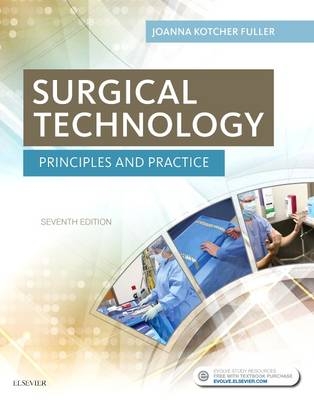
Surgical Technology
Saunders (Verlag)
978-0-323-39473-4 (ISBN)
- Titel erscheint in neuer Auflage
- Artikel merken
Comprehensive coverage addresses all areas of the AST Core Curriculum for Surgical Technology.
Reader-friendly writing style and organization utilizes a mentoring approach to present content within the building blocks of fundamentals, aseptic technique, the role and function of the surgical technologist, and surgical procedures.
Consistent chapter format breaks down each surgical procedure in an easy-to-understand way making it easy for students to comprehend the key elements of more than 70 procedures.
Experienced author/consulting editor team lends a breadth of experience for a well-rounded view of life in the operating room and multiple perspective focused on quality patient care.
Over 1,200 full-color illustrations and clinical photos bring concepts and procedures to life.
Robust practice opportunities include review questions and case studies at the end of each chapter along with crosswords, additional review questions, and surgical practice videos found on the Evolve companion website.
Learning objectives serve as checkpoints for comprehension and as study tools in preparation for examinations.
Key terminology appears in boldface and in color within chapter discussions and are defined and cross-referenced to chapters in a back-of-book glossary.
Key concepts are covered in a bulleted list at the end of each chapter discussion to summarize and rephrase chapter concepts.
References and bibliographies provide a listing of in-text and additional citations of scientific research.
Pathology appendix summarizes the most commonly seen pathological processes and organizes them by body system.
Website mentions are highlighted within the text to draw readers' attention to available videos in the Evolve Resources and suggested websites to visit for additional information on content covered.
NEW! Content on dynamic topics focus on emerging areas of research and study including the latest equipment and technology, robotics and lasers, advances in orthopedic, cardiovascular, and neurological surgeries, and professionalism.
NEW! Improved surgical procedures now incorporate pathology, technical points and discussion, as well as information on patient positioning, prepping, draping, incision, instruments, and supplies.
NEW! Instrument tables showcase relevant instruments and accompanying sizes in an illustrated format.
NEW! Expanded technique boxes succinctly summarize the key steps within skills or procedures to highlight core competencies.
NEW! Knowledge and skills review at the beginning of chapters alerts readers to key information and skills incorporated into chapter discussion.
NEW! Updated artwork and photographs feature the most current supplies and equipment to vividly demonstrate aseptic technique, sterilization and disinfection, surgical instruments, patient positioning, skin preparation, and draping.
Joanna Kotcher holds a Master's Degree in Global Health, a Bachelor of Science in Nursing and a BA in International Studies. She has coordinated emergency response in conflict environments for the past 18 years in such locations as Kosovo, Central Asia (Tajikistan), Afghanistan, Darfur, Gaza and the OPT, Somaliland, Syria, and Iraq. As a Medical/Surgical Coordinator Ms. Kotcher has coordinated and managed medical teams in the start-up and full implementation stages of projects that assist populations in need of emergency medical and surgical care during armed conflict. She has also coordinated post-conflict actions during the period immediately following "official cessation of armed conflict. Working in insecure environments, Ms. Kotcher has extensive experience in the design and implementation of medical/surgical actions, team building and support, implementation of standards and guidelines, medical and nursing staff training, and team mentoring. She continues to study and learn while working in the field and maintaining membership with notable professional organizations in the combined disciplines of humanitarian studies and medical/surgical assistance.
PART I: SURGICAL TECHNOLOGY PRINCIPLES
1. The Surgical Technologist
2. Communication and Teamwork
3. Law, Documentation, and Professional Ethics
4. The Health Care Facility
5. The Patient
6. Diagnostic and Assessment Procedures
7. Environmental Hazards
8. Microbes and the Process of Infection
9. The Principles and Practice of Aseptic Technique
10. Decontamination, Sterilization, and Disinfection
11. Surgical Instruments
12. Perioperative Pharmacology
13. Anesthesia and Physiological Monitoring
14. Postanesthesia Recovery
15. Death and Dying
16. Physics and Information Technology
17. Energy Sources in Surgery
18. Moving, Handling, and Positioning the Surgical Patient
19. Surgical Skin Preparation and Draping
20. Case Planning and Intraoperative Procedures
21. Management of the Surgical Wound
PART II: SURGICAL TECHNOLOGY PRACTICE
22. Minimally Invasive Endoscopic and Robotic-Assisted Surgery
23. General Surgery
24. Gynecological and Obstetrical Surgery
25. Genitourinary Surgery
26. Ophthalmic Surgery
27. Surgery of the Ear, Nose, Pharynx, and Larynx
28. Oral and Maxillofacial Surgery
29. Plastic and Reconstructive Surgery
30. Orthopedic Surgery
31. Peripheral Vascular Surgery
32. Thoracic and Pulmonary Surgery
33. Cardiac Surgery
34. Pediatric Surgery
35. Neurosurgery
36. Emergency Trauma Surgery
37. Disaster Preparedness and Response
APPENDIXES:
A. Common Pathology by System
B. Drugs and Substances Associated with Surgery
C. Math Review
D. Computer Operations
GLOSSARY
INDEX
| Erscheinungsdatum | 20.03.2017 |
|---|---|
| Zusatzinfo | Approx. 1380 illustrations (1350 in full color); Illustrations |
| Verlagsort | Philadelphia |
| Sprache | englisch |
| Maße | 216 x 279 mm |
| Gewicht | 2470 g |
| Themenwelt | Medizin / Pharmazie ► Medizinische Fachgebiete ► Chirurgie |
| Pflege ► Fachpflege ► Chirurgie / OP-Pflege / Orthopädie | |
| ISBN-10 | 0-323-39473-6 / 0323394736 |
| ISBN-13 | 978-0-323-39473-4 / 9780323394734 |
| Zustand | Neuware |
| Haben Sie eine Frage zum Produkt? |
aus dem Bereich



